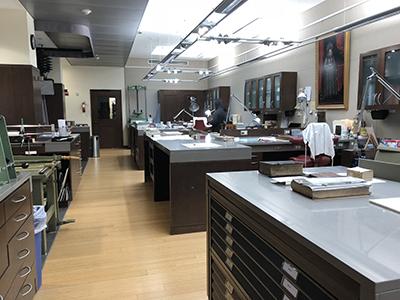Annika Ariel ’19 planned to investigate romantic depictions of madness in Hamlet and King Lear during her two weeks at the Folger. When a Folger staff member suggested listening to a podcast about Shakespeare’s influence on modern-day psychiatry, she realized her research topic had real-world implications that led her to a new way of thinking about Shakespeare and how we understand mental health today.
This is the way many Fellows’ projects tend to unfold. Students who are interested in a subject begin to see different ways of investigating their initial question, thanks to Folger staff and mentors assigned to help them navigate the library’s vast archives. The Fellowship isn’t necessarily about answering the initial question. Rather, it’s learning how to do the research that matters.
“There are so many materials, so many possible rabbit holes,” said Phuong-Nghi Pham ’18 during the Folger Fellows’ presentations last week at the Center for Humanistic Inquiry, which oversees the program at Amherst. “You really have to figure out where you want to go with your topic,” she said. Pham explored the role and the staging of music in Renaissance theater, and made use of the library’s digital database that allowed her to browse plays based on their musical cues.

Considered the premier research library in the world for the study of Shakespeare and the English Renaissance, the Folger also holds major collections for research in European arts, culture and history from the early 15th century to the end of the 18th century. The library’s founder, Henry Clay Folger, graduated from Amherst in 1879 and left the library to the College upon his death in 1930.
Thanks to the wide range of materials available at the Folger, students can conduct research entirely unrelated to Shakespeare, if they wish. Ann Guo ’20 looked at early-17th- through mid-18th-century references to tea and foods as a lens into conceptions of racial and ethnic “others.” Ariella Goldberg ’19 investigated Renaissance cryptography. And Isabella Berkley ’19 researched 17th-century travel writing and its influence on England’s relationship with the Caribbean. Looking at diaries and notes written by travelers and Caribbean natives at the time, Berkley aimed to investigate how colonial memory may have informed the current political system in Cuba. She’s currently studying abroad in Cuba, and plans to continue researching the topic for her senior thesis.
Jane Bragdon ’20 decided to delve deeper into researching an oil painting she encountered as an intern at the Mead Art Museum: Thomas Francis Dicksee’s Ophelia (1875), which depicts Hamlet’s ill-fated lover seated on the shore of a brook, moments before her suicide. “Ophelia’s suicide is perhaps the most iconic depiction of any Shakespeare character,” said Bragdon, who found more than four dozen depictions over the course of her research. Her biggest takeaway? “I loved learning how to use a research library,” she said, “and getting a peek at an intellectual career path I’m interested in.” She plans to become an art historian, and hopes to conduct similar research in the future.

